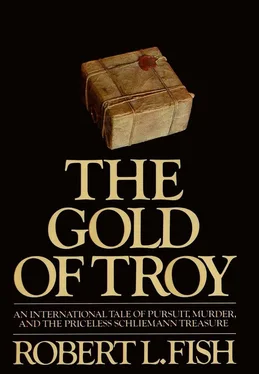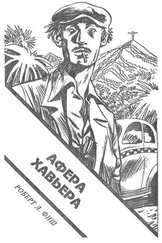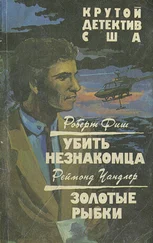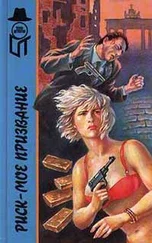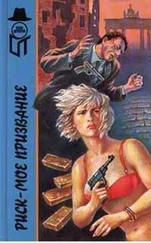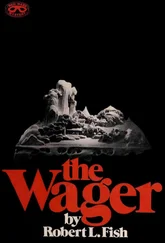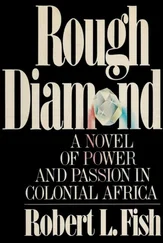Leningrad — May
A meeting was in progress in the offices of the Soviet State Security Committee, Leningrad branch, in the Zherinskaja Ulica in the Petrogradskaya Storona section of the city. Present were Colonel Ilya Berezhkov, head of the Leningrad section, Major Serge Ulanov of the Scientific section of the KGB, and a visitor from KGB headquarters in Moscow, a rugged, gray-haired man, Colonel Vasily Vashugin, Ulanov’s superior. From the tall windows of the office, the spires of Peter-Paul fortress could be seen sparkling in the bright spring sunshine beyond the open stretches of Lenin Park, with a glimpse of the broad Neva beyond, separating the area from the city’s principal buildings on the south side of the river. At the men’s elbows empty tea cups were being used as ashtrays.
Vashugin was speaking slowly, thoughtfully. “The question is a very simple one. Why ?”
“The question is a simple one,” Berezhkov said dryly. “It’s the answer that’s so difficult.”
Vashugin did not smile. Instead he nodded his head vigorously as if in recognition of the basic profundity of the other man’s statement.
“Exactly! Why is the American OSS — CIA now, of course — after all these years, and after all the secrecy with which they have surrounded their theft of the Schliemann collection, suddenly deciding to put it up for auction? Why now?”
Ulanov stirred in his chair. He was a stocky man in his early sixties with a shock of short white hair that seemed to stand on end. He crushed out his cigarette and frowned.
“I wonder...”
Vashugin stared at him. “You wonder what?”
“I wonder if it really is the Americans who are offering it for sale? The American CIA, I mean. After all, there are no truly national museums in America. Oh, I know they have the Smithsonian, but that’s not the same thing—”
Vashugin was looking at him with a frown. “What’s that got to do with it?”
Ulanov lit another cigarette while forming his answer. He tucked it in one corner of his mouth as he spoke; blasts of smoke came out with the words.
“What I’m driving at is that it was the then OSS who stole the collection — or at least that’s the best conclusion we’ve been able to come to in all the years. Where would they have kept it all these years? Not, I’m sure, at the Smithsonian. In some vault at their Langley headquarters? And if they did, why would they be selling it now?”
“Exactly the question I’ve been asking,” Vashugin said shortly, quite as if wondering whether Ulanov had been paying attention.
“I’m sorry, but you apparently still don’t understand the point I’m trying to make,” Ulanov said, a bit stubbornly. “What I’m suggesting is far more important. Suppose — as we’ve supposed all the years since the war — that the OSS stole it from our bunker in Berlin, and that the treasure has been in their possession, the possession of the CIA, now, in Langley, Virginia, ever since. In one of their vaults there.” He paused to shake ash from his cigarette, immediately tucking it back in place. “Now, we can be rather sure that the CIA doesn’t need fifteen or twenty million dollars suddenly — they have an almost unlimited budget.”
Vashugin was watching him with narrowed eyes. “So?”
“So it is very possible that it is not the CIA who is offering the treasure for sale. It is possible that someone else has the treasure and is offering it. And if that is the case, then they must have managed in some fashion to get the treasure from Langley, or from wherever the CIA has been holding it. If there had been a theft of this size from the Smithsonian, for example, I’m sure it would have been impossible to keep it quiet. But from the CIA?” He smiled, a humorless smile. “Exactly as we kept the theft from the bunker quiet. Out of pride, if nothing else.”
Vashugin was nodding his head slowly. “I see. You are suggesting that someone was able to breach the security of the CIA, is that it?”
Ulanov shrugged. “It seems to me to be at least a possibility.”
Berezhkov wrinkled his forehead in thought, and then shook his head, not so much in denial, as in wonder.
“I’m not so sure. Let’s not underestimate the CIA. When they were the OSS they managed to steal the stuff from under our noses, so to speak. We had taken Berlin and were in the process of organizing it. Then the area was divided into zones. That was the first mistake. Allowing the city itself to be divided was the second mistake. You can see where it’s gotten everyone today. A city belonging to one country inside the borders of another country. Ridiculous!” He shrugged, realizing he was complaining about something he could do nothing about. He also seemed to realize he was getting away from the point. “However, that was the political decision at the time, and as a result there were soldiers from one country, one army, one zone, wandering all over every other zone. And a few days later the treasure is stolen. Who else would the Germans have told about the treasure, or where they had hidden it? The British?” Berezhkov sniffed. “The French? Us?” He sniffed louder. “Never. Only the Americans. And who else could have, or would have, been able to arrange it in those confused days? The forged papers? Everything? The OSS, that’s who.”
“We’re fairly certain of that,” Vashugin said, seeing in his mind’s eye the ancient investigation, such as it was. “We’re positive the man who forged the papers that released the Schliemann collection from the custody of the officer in charge of the bunker, was Petterssen, the Swedish forger. Our experts studied the forged documents and made careful comparisons with other forgeries known to have been done by Petterssen, and there was no doubt he was responsible. In addition, he answered the description of the man who was one of those who removed the crate at Bad Freienwalde; even though both men were dressed as NKVD — or at least that was what the idiot trainman assumed they were. A black suit, a white shirt, and you’re automatically NKVD!” He laughed, but without humor, looking down at his own neat gray herring-bone tweed, and then to Ulanov’s sport shirt, open at the neck, and then shrugged. “In any event... the guard said Petterssen and the man with him had documents, but of course it would be no trouble to a man of Petterssen’s ability to also forge these documents.”
Vashugin considered the other two men. His voice was quiet, as if asking them to point out any faults in the logic of the analysis he had presented to his superiors years before after the desultory investigation of the case that had been made.
“The man with Petterssen said nothing from the time he got on the train in Berlin until the two got off in Bad Freienwalde. But the guard said he looked quite Anglo-Saxon. The trainman was sure — after a bit of interrogation by a pair of rather overefficient NKVD men,” Vashugin added dryly, “that he was undoubtedly American. I believe he was, despite the overenthusiasm of the interrogators. But the important question at the time was, where did Petterssen disappear to? He didn’t go to Denmark or Sweden, because we certainly looked hard enough and long enough for him in those and the other Scandinavian countries. And it wasn’t all that easy for him to get out of Germany in any normal fashion, because he was watched for, and he was easily identifiable. No, there’s no doubt in my mind that Petterssen ended up in Langley, Virginia, where he probably forged Russian rubles or Chinese currency until he died or was retired.” He shook his head. “No, I don’t underestimate the CIA. They did a good job in stealing the Schliemann treasure from us.”
“They did even better,” Ulanov said dryly. “They also managed to convince the entire world that we have the collection ourselves. Possibly in the basement of the Hermitage here in Leningrad, I expect.” He shook his head, almost in admiration, and crushed out his cigarette. “And I also am not underestimating them. I merely mention it as a possibility. I don’t see any others. I simply cannot see the CIA behind this auction. It wouldn’t be the way they would handle it, any more than we would handle it in this open fashion.”
Читать дальше
